高中英语 unit 2《the olympic games-vocabulary and useful expressions》教案 新人教版必修2
高中英语人教版必修2Unit2Theolympicgames教案(系列一)
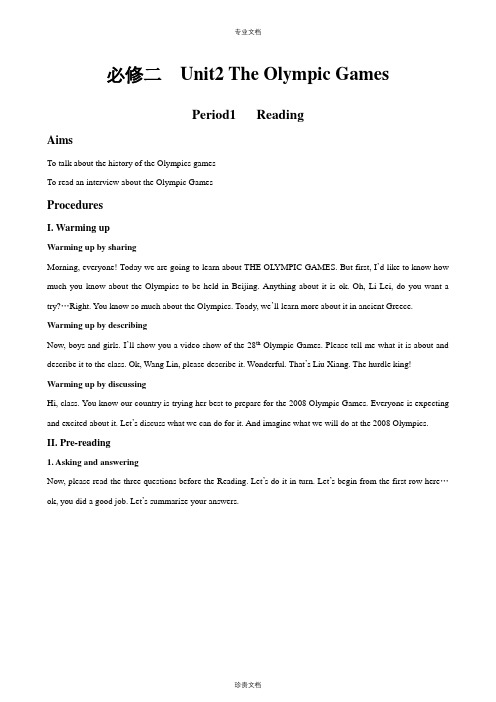
必修二Unit2 The Olympic GamesPeriod1 ReadingAimsTo talk about the history of the Olympics gamesTo read an interview about the Olympic GamesProceduresI. Warming upWarming up by sharingMorning, everyone! Today we are going to learn about THE OL YMPIC GAMES. But first, I’d like to know how much you know about the Olympics to be held in Beijing. Anything about it is ok. Oh, Li Lei, do you want a try?…Right. You know so much about the Olympics. Toady, we’ll learn more about it in ancient Greece. Warming up by describingNow, boys and girls. I’ll show you a video show of the 28th Olympic Games. Please tell me what it is about and describe it to the class. Ok, Wang Lin, please describe it. Wonderful. That’s Liu Xiang. The hurdle king! Warming up by discussingHi, class. You know our country is trying her best to prepare for the 2008 Olympic Games. Everyone is expecting and excited about it. Let’s discuss what we can do for it. And imagine what we will do at the 2008 Olympics.II. Pre-reading1. Asking and answeringNow, please read the three questions before the Reading. Let’s do it in turn. Let’s begin from the first row here…ok, you did a good job. Let’s summarize your answers.2. Imaging and introducingPlease look at the three pictures in the reading. Please talk about them. Imagine whatever you can.3. Talking and SharingWe know there are many differences and similarities about the ancient and modern Olympics. Do you know anything about them? You can simply guess. Yes, Lucy, try …III. Reading1. Reading aloud to the recording and finding the general ideaNow please listen and read aloud to the recording of the text AN INTERVIEW. Pay attention to the pronunciation and intonation as well as the pauses within each sentence. Then try to get the general idea of the passage. Have you got the main idea?Yes, it tells us the differences and the similarities between the ancient and modern Olympics.2. Reading and actingNow let’s play the parts of the Greek writer Pausanias and the Chinese girl Li Li. Now boys, you are Pausanias; girls, you are Li Li. Please pay attention to the bold words.3. Reading and findingNow read the text again. The boys shall try to finish the task: What was the ancient Olympics like? The girls shall try to finish the task: What is the modern Olympics like?4. Reading and collecting informationOk, now let’s read it silently. First let’s talk about the same points between the ancient and modern Olympics. Who can answer? Any volunteers?Then let’s come to the differences.5. Reading and underliningNext you are to read and underline all the useful expressions or collocations in the passage. Copy them to your notebook after class as homework.ⅣClosing downClosing down by doing exerciseTo end the lesson you are to do the comprehending exercises 1 & 2.Closing down by discussingYou know our government has tried its best to compete for hosting the 29th Olympic Games. It has cost a lot of money. Do you think it is worthwhile? Why?Closing by imaginingImagine what we will do and what we can do for the 29th Olympic Games now.Closing down by narratingWe can see the text is written in a conversational style. And there are two speakers. One is Pausanias, a Greek writer 2000 years ago, the other is Li Li, a Chinese girl. Now let’s change it into a narrative style. In other words, let’s describe the ancient and modern Olympic Games in our own words. Who would like to have a try?Closing down by summarizingAs we have finished the passage we’ll sum up what we have learned. First let’s see the writing skills. It is written in a conversational style. It’s in a very interesting way. It adopts a dialogue between Pausanias who lived 2000 years ago and a Chinese gird in modern world. Through their dialogue, the differences and similarities between the ancient and modern Olympic Games are made known to the readers. Just because it is in a conversational style, there are quite a few oral spoken English and elliptical phrases.Through the comparison between the ancient and modern Olympic Games, we have learned the differences and the similarities between them. Now we can have a deep understanding of the Games. From the passage, we can have a deep understanding of the Games. From the passage, we can also get to know that the Olympic Games are developing and improving. It’s our duty to make the Olympic Games better and healthier. We know that one of the slogans for 2008 Beijing Olympic Games is Green Olympic Games. It shows that people are paying more and more attention to our environment.。
(人教新课标)高一英语必修2Unit 2 The Olympic Games Period 2 Vocabulary 课件
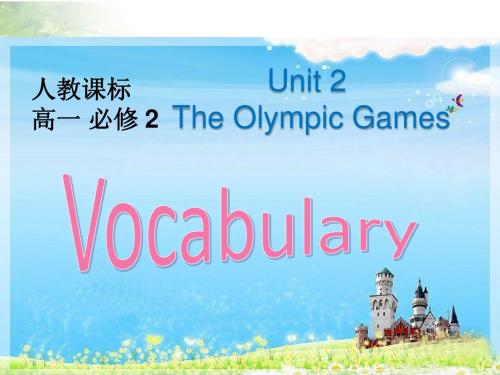
即学即练
C us in the 1. Our headmaster will___ discussion this afternoon. A. take part in B. join in C. join D. attend 2. How many ___ B will you ___? A. incidents, join B. events, join in C. accidents, attend D. games, enter
人教课标 高一 必修 2
Unit 2 The Olympic Games
本课件主要是讲解重点单词和短语,并且对 文中出现的长句做了解析. 首先,让学生翻译一些关于奥运会的短语作 为导入,同时,也扩大了他们的词汇量和知识。 单词和短语讲解部分,既有多个短语的扩展,也 有同个单词多个词型的扩展,在讲解后及时巩固 ,而且,巩固题型多样化,题目精细化,能帮助 学生最大程度的内化为自己的知识。
find out about 弄清有关……的情况 eg. The police are trying hard to find out about the accident. 警察正尽力查出事故的情况。
find /find out / discover (1) It’s so boring to wait here, John, go to
即学即练
1. She decided to compete _____ in the model contest. 2. Several companies are competing against/with ____________ each other for the contract.
3. We don’t only compete _____ for medal, but
Unit 2 The Olympic Games(必修二)

Unit 2 The Olympic Games(人教版必修二)一.重点词汇:ancient compete competitor medal mascot Greece Greek magical volunteer homeland regular basis athlete admit slave nowadays gymnastics athletics stadium gymnasium host responsibility olive wreath replace motto swift similarity Athens charge physical fine poster advertise princess glory bargain prince hopeless foolish goddess pain deserve striker take part in stand for as well in charge one after another二.单元重点词汇讲解1.compete vi.比赛;竞争(1) compete in …在……方面竞争compete for ... 为……而竞争compete with/against sb. for sth. 因……与……竞争(2) competition n. 竞争competitor n. 竞争者;对手competitive adj. 竞争性的;比赛性e.g. How many countries competed in the ancient OlympicGames?I’m training hard, hoping to compete in the 31st Olympic Games.2.admit vt. & vi.容许;承认;接纳(1) be admitted to/into ... 被允许/接纳进入……be admitted as ...作为……被接受(2)admit+doing/having done sth. 承认做了某事admit that ... 承认……admit+n.&pron.+to be ... 承认……为……e.g. Only athletes who have reached the agreed standard for their event will be admitted as competitors.Dina admitted feeling hurt by what I had said.The hall in our school can admit 100 people.3.host vt.做东;主办;招待n.主人;东道主;(广播或电视节目的)主持人host team主队guest team 客队host city 主办城市e.g. We are determined to beat the guest team from Liaoning.We all like He Jiong, the host of the Happy Camp.I was away, so my son acted as host.4.responsibility n.责任;职责;责任心;义务(1)a sense of responsibility 责任感take responsibility for 对……负责(2) responsible adj. 负责任的;有责任感的be responsible for sth. 对……负责e.g. It’s a great responsibility but also a great honour to be chosen.It’s my responsibility to take good care of my family. 5.replace vt.取代;替换;代替;放回原处(1) replace A with B用B代替Areplace sb.as 代替某人当……(2) take the place of (=replace) 取代;代替in place of取代;代替e.g. So even the olive wreath has been replaced!If he can’t manage it, we will find someone to replace him.Would you please replace the magazines after reading them?6.take part in参加;参与take part参加take an active part in 积极参加e.g. They organized a discussion, but I didn’t take part.Who could not take part in the ancient Olympic Games?Will you take part in the English evening with us?7.stand for代表;象征;表示;主张stand by 站在旁边;旁观stand out 显眼;突出e.g. As we all know, an olive wreath stands for peace.How can you stand by when she needs help?8.every four years (=every fourth year)每四年;每隔三年every与数词或other, few连用,表示时间或空间上的间隔,意为“每……的;每隔……的”。
高中英语必修二-unit2-the-olympic-games
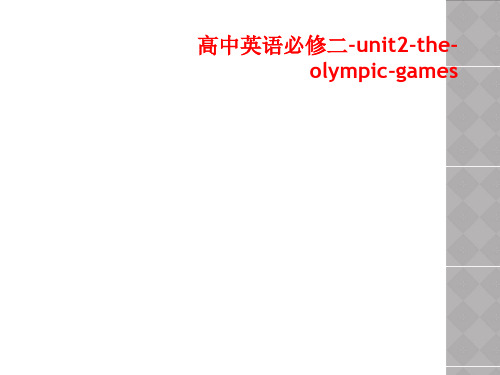
I’ve come to your time to find out about the _p_re_s_e_n_t_-d_a_y__ Olympic Games.
Task1: Skimming What questions does Pausanias ask?
The Summer Olympics The Winter Olympics
Sets every four years
two years before the Summer Games
running races, swimming Time sailing, team sports
skiing, ice skating
Q4: Where are all the athletes housed?
• special village • reception building • stadium • gymnasium
Task2: Scanning
Q5: Dose anyone want to host the Olympic Games? It’s a great __r_e_sp_o_n_s_i_b_il_itybut also a great _h_o_n_o_rto be chosen.
Q1: How often do you hold your Games? Q2: How can the runners enjoy competing in winter? What about the horses? Q3: Do you mean the Greek world?
Q4: Where are all the athletes housed? Q5. Dose anyone want to host the Olympic Games?
高中英语人教版必修2《unit 2 The Olympic Games》课件 (2)

What He does his best and people say appreciates any help given
to him.
His situation
What he did
What it showed
Read the stories and fill in the chart below.
What happened
What he did
Bjornar Hakensmoen A Canadian’s skiing pole broke during a race.
He gave her another pole even though his Norwegian team were competing against her team.
What people thought
Kip Keino He was very ill and in great pain. He still took part in the race.
True courage and perseverance. They praised him by putting him on the front cover of a sports magazine.
Try to find more stories about the Olympic Games on the Internet.
人教版 高中英语
THANKS
人教版 高中英语
Unit பைடு நூலகம் The Olympic Games
Three Inspiring Stories about the Olympic Games
高中英语Unit 2《The Olympic Games》课件(2) 新人教版必修2

Ⅲ.The Olympic Creed(信条,教条)
"The most important thing in the Olympic Games is not to win but to take part, just as the most important thing in life is not the triumph, but the struggle. The essential thing is not to have conquered, but to have fought well."
One world ,one dream Green Olympics Hi-tech Olympics
Slogan: Theme:
People’s Olympics
ks5u精品课件
ks5u精品课件
Olive tree branch
ks5u精品课件
Ⅵ. the 29th Olympic Games
When: Where: Aug8th.2008
Beijing (Qingdao/ Hongkong / Qinghuangdao/Shanghai/Sheng yang/Tianjin)
ks5u精ቤተ መጻሕፍቲ ባይዱ课件
basketball
ks5u精品课件
Weight-lifting
ks5u精品课件
Table tennis
ks5u精品课件
gymnastics
ks5u精品课件
1.Talk about the knowledge of the Olympic Games and discuss it. 2.Write a passage on “the effects of the Olympic Games on Beijing”.
人教版高中英语 必修二 Unit2 《The Olympic Games ---Reading》 课
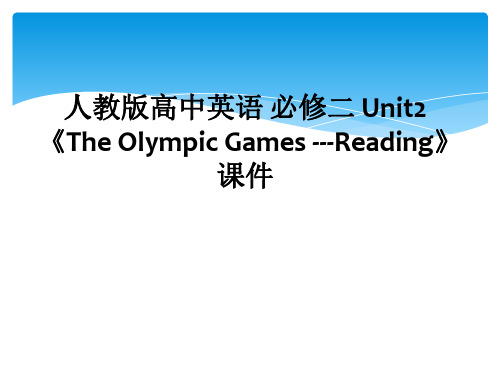
Olympic Games.
(T )
5. We feel proud because we have finally
got the chance to hold the Olympic
Games.
(T )
6. Horse riding events belong to the
A(
) village is built for competitors to live in,
a ( ) for competitors, a large swimming pool, a
( ) as well as seats for those who watch the
games. The oliver wreath has been ( ) by
the ( ) olympics. both of them are held every (
).All countries can take ( ) if their athletes
reached the standard to the game. Women are not
only ( ) to join in but playing a very ( ) role.
Medals
1. having running races 2. held every four years 3. no prize money for winners 4. the same motto: Swifter, Higher and
Stronger 5. seen as most important competition
高中英语必修2unit2TheOlympicGames
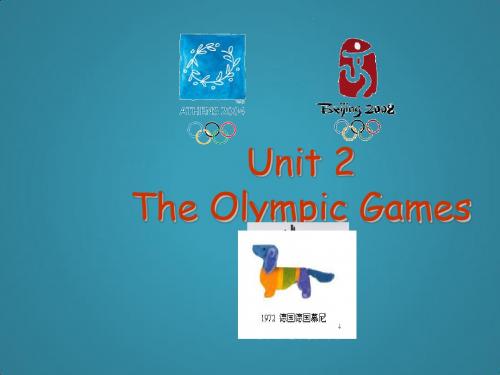
Sets(kinds) Only Summer Both Summer and Olympics Games Winter Olympic Games
Host city Athens in Greece
many cities in the world
Athletes only men
anybody reachingthe standard
Who What What What What
was interests surprises amazes pleases
Pausanias? Pausanias? Pausanias? Pausanias? Pausanias?
Find some key words of the “Reading” to catch the main idea.
Let’s enjoy!
Homework
Search for more information about Olympics on net:
Thank you for attending!
Track Long running,100m races: running,4×100 relay race… …
Field High jumping, long jumping, races: shot-putting,discus-throwing… …
Some Diving, boat-race, sailing, more: free-gym, shooting… …
Events
A few
hundreds of kinds
•Listen to the tape
and then finish the Ex1. in Comprehending, Page 11
人教版高中英语必修二Unit2 The Olympic Games全解

人教版高中英语必修一Unit2 The Olympic Games全解(含练习和答案)Ⅰ. 常考单词必背1. compete vi. 比赛;竞争Runners from many provinces are competing with each other for the first prize.来自许多省的赛跑运动员正在为获得第一名而彼此竞争。
[快速闪记](1) compete for 为……而比赛/竞争compete against/with 与……竞争/比赛compete in 参加……的比赛(2) competition n.竞争;角逐competitive adj. 竞争的competitor n.竞争者2.volunteer n.志愿者;志愿兵 adj. 志愿的;义务的vt. &vi. 自愿An army of volunteers cooked meals for the children.一大群义务工作者为孩子们做饭。
He volunteered to water our plants.他自告奋勇给我们的树木浇水。
3.basis n.基础;根据The basis of good marriage is trust.美满婚姻的基础是信任。
[快速闪记](1) on a regular basis 经常地;定期地(2) basic adj. 基本的basically adv. 基本地;根本地base n.基地 vt. 以……为基础4. admit vt.&vi.容许;承认;接纳We have to admit that he's a highly competent man.我们必须承认他是个非常能干的人。
[快速闪记]be admitted as 作为……被接受admit sb/sth to be... 承认某人/某物是……admit sb to/into... 允许某人进入……admit(to)doing sth 承认做某事5.responsibility n.责任;职责Now that you are already 18 years old, you should take responsibility for what you have done.既然你已经十八岁了,你应该对你的行为负责。
高中英语 必修二 Unit2 《The Olympic Games ---Reading》

Summary of the interview
The Olympic Games are the biggest sports meeting in the world, which include two kinds, the _S_u_m___m__earnd the ____W__inter Olympics. Both of them are _____ ehvelrdy _____ ___f_o.uArllyears
interviewer
Modern times
Liyan interviewee
The Introduction
Pausanias, who was a Greek writer about 2,000 years ago, has come on a magical journey on March 18th, 2007 to find out the present-day Olympic Games. He is mow interviewing Li Yan, a volunteer for the 2008 Olympic Games.
The mottos are the same. They
aSwreif:t_e_r,__h_ig_h__e_r_a_n_d__s_t_r_o_n_g_e_r________.
Some events are the same, such
as_ru__n_n_in__g_,_j_u_m_p__in_g__, _s_h_o_o_t_i_n_g_,_t_h_r_o_w__in_g_.… Both are held __e_v_e_r_y_f_o_u_r__y_e_a_r_s____.
to live in, a __s_t_a_d__iu_mfor competitions, a large swimming pool, a _g_y__m__n_a__s_iuams well as seats for those who watch the games. It’s a great _____ to hhoosnt othre Olympic Games. The Olive
高中英语必修(2)Unit-2-The-Olympic-Games

高中英语必修(2)Unit 2 The Olympic Games高中英语必修(2)Unit 2 The Olympic Games_教学设计(教案)教学形式1、任务型教学2、合作学习3、商量学情分析值得我们留意和思考的是,最根本的课前预习,课后复习,制定学习打算等方面,有的同学显得被动,没有养成良好的预习、复习,有规律制定自己学习打算的习惯,大多数只有在老师的要求下才学习。
对学英语的意义和目的不够明确,缺乏学英语的力气和方法,有些同学没有主动主动学英语的习惯。
以往的教学模式学习理念使同学丢失了学习的自主性,无视了同学创新精神和实践力气的培育,教学过程以同学被动承受式学习为主要表现形式,缺少同学主动主动的参与,使同学失去了学习的乐趣,把学英语当成了负担。
新的教学理念被越来越多的人所承受,课堂显现出在老师引领关怀下,同学自主学习、主动参与、主动思维、充分进展的主线、做到真正意义上的,把课堂还给同学。
随之而来的,如何培育同学自主性创新学习力气正成为我们努力探究的问题。
本单元以世界性的体育盛会──Olympic Games 为话题,旨在通过本单元的教学,使同学了解奥运会的起源、宗旨、竞赛工程以及古现代奥运会的异同。
学会用英语表达自己的爱好爱好以及如何向别人推举某一种爱好,同时培育同学对体育运动的爱好。
引导同学觉察、感悟将来时态的被动构造的语言规律,培育语感;关怀同学按类别归纳整理,用有效的记忆词汇的方法来把握与奥运会相关的词汇;同学能够表达自己的爱好爱好以及如何向别人推举某一种爱好。
教学目标依据?新课程标准?关于总目标的具体描述,结合高一同学实际和教材内容,我们分语言学问、语言技能、学习策略、情感看法、文化意识五个方面制定相应教学目标:1) 语言学问:双基词汇:学习把握一些有关奥运会的词汇,如:compete, competitor, medal, Greece, Greek, athlete, stadium, gymnasium等。
高中英语 Unit 2 The Olympic Games Reading II and lang
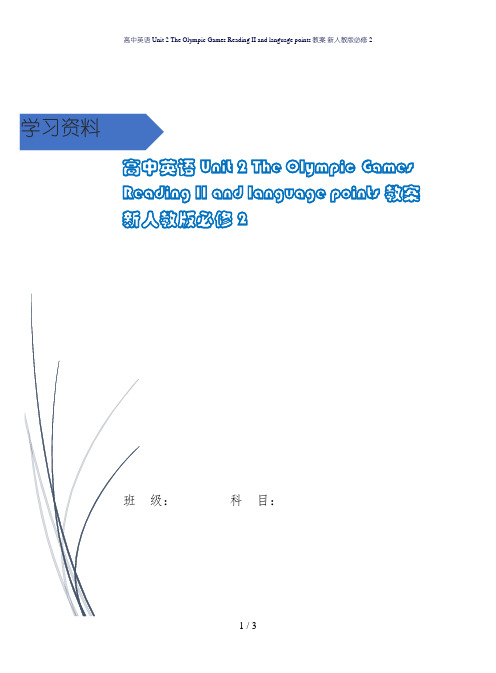
Eg: I write my own songs and I play the guitar as well.
as well as 同……一样;也是;还有(连接两个并列的成份)
Eg: It is unpleasant in summer as well as in winter.
Step5:Consolidation
Do some exercises to consolidate
Step6:Homework
板书设计
教学反思
Unit2 The Olympic Games
课 题
课 型
ReadingII and language points
年级
高一
日 期
Unit2 The Olympic Games
新授
主备人
复备人
授课人
教 学 目 标
掌握词汇compete, competitor, honest, host, magical, interview, admit, as well as等
Step4: Language Points
1。compete vi.=take part in
compete with/against sb。for sth。 in competitor competition
2.take part in/ join in/join/ attend区别
3。(1)。used to do/
Step1:Students read the vocabulary of Unit2 together。
Step2: Review
what we have learnt in the last class
高中英语 Unit 2 The Olympic Games Language Language p

Step3:Language points
观察
1) Does a cultural relic always have to be rare and valuable? Is it enough to havesurvivedfor a long time?
4.The room was __________ with gold and jewels, which took the country’s best artists about ten years to make。
5.This was a time when the two countries were ___ ___.
2) Only the boysurvived the fire, which means he is the onlysurvivor
3) The boy’ssurvivalmade everyone surprised
1。 survive
归纳
1)survivevi.___幸存,生还vt。__幸免于_
That dictionarybelongs tothe library。
1) In 1716 he gave it to Peter the Great.In return, the Czar sent him a troop of his best soldiers.
2) The Czar sent him a troop of his best soldiersin return forthe amber room。。
高一英语Unit2_The_Olympic_Games
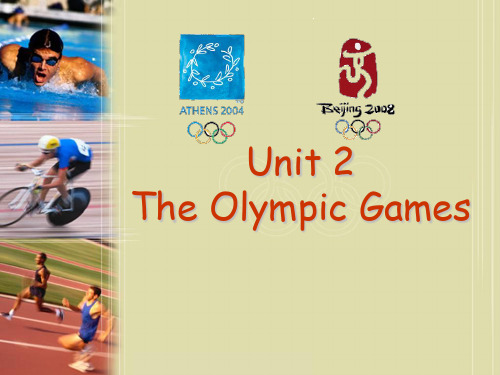
Reasons not to host the Olympic Games
many stadiums
do harm to the enviroment
Thank you for attending!
Unit 2 The Olympic Games
• Are you familiar with these pictures? and How much do you konw about the Olympic Games?
Do you recognise them?
medals
an olive wreath
Aim
Motto
Swifter Higher, and Stronger. ___________________________________
Differences
The ancient Olympics Only Summer Olympic Games fewer Only men from Greek _______City. Greece an olive wreath _______________ The modern Olympics Summer and_______ Winter Olympic Games skiing More events, like_________ and ________ ice skiing all over the world From ______________ Including _________ women ___________________ Every country is possible Medals _____
• A. Medals Houses B. Money C. Olive wreath D.
高中英语《Unit 2 The Olympic Games
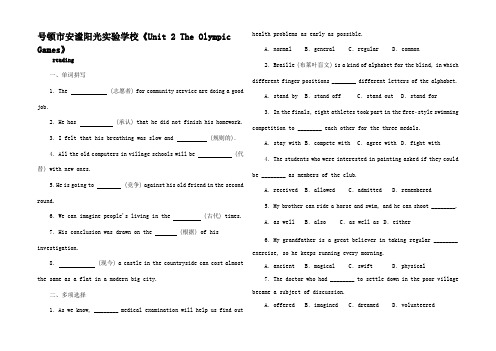
号顿市安谧阳光实验学校《Unit 2 The Olympic Games》reading一、单词拼写1.The (志愿者) for community service are doing a good job.2.He has (承认) that he did not finish his homework.3.I felt that his breathing was slow and (规则的).4.All the old computers in village schools will be (代替) with new ones.5.He is going to (竞争) against his old friend in the second round.6.We can imagine people's living in the (古代) times.7.His conclusion was drawn on the (根据) of his investigation.8. (现今) a castle in the countryside can cost almost the same as a flat in a modern big city.二、多项选择1.As we know, ________ medical examination will help us find out health problems as early as possible.A.normal B.general C.regular D.common2.Braille (布莱叶盲文) is a kind of alphabet for the blind, in which different finger positions ________ different letters of the alphabet.A.stand by B.stand off C.stand out D.stand for3.In the finals, eight athletes took p art in the freestyle swimming competition to ________ each other for the three medals.A.stay with B.compete with C.agree with D.fight with4.The students who were interested in painting asked if they could be ________ as members of the club.A.received B.allowed C.admitted D.remembered5.My brother can ride a horse and swim, and he can shoot ________.A.as well B.also C.as well as D.either6.My grandfather is a great believer in taking regular ________ exercise, so he keeps running every morning.A.ancient B.magical C.swift D.physical7.The doctor who had ________ to settle down in the poor village became a subject of discussion.A.offered B.imagined C.dreamed D.volunteered8.The next morning my father came over, ________ the broken window and even made a curtain for the room.A.removed B.recovered C. replaced D.rescued9.—I wonder how ________ you'll water this kind of flower.—Every other day.A.often B.long C.soon D.much10.As everyone knows, in ______China there were many heroes like Yue Fei and Qi Jiguang.A.agedB.ancientC.oldD.elder三、阅读理解AAn old gentleman who lives a few doors away from me can always be seen with a bag. He goes out by himself and picks up plastic bottles, plastic bags and pieces of paper everywhere. He does it all carefully and never complains.The children in the nearby school are probably responsible for some of that litter (废弃物).“There will come a time when they know better,” he said.“It's just not yet. So, I'll do it for them.”Well, this morning I was out walking my neighbor's dog when I saw another neighbor, a much younger man, out doing the same thing! He had his two little sons with him and they were having good fun trying to pick up the litter.When I commented on what a good job he was doing, he said, “Well, an older fellow in our street does this. And my friend and I thought it wasn't fair that he had to do it all the time, so now we take turns.”Not only was he taking a turn, not only did he have a friend join in as well, but he was passing on the lesson to the next generation (代)!By the time I had returned the dog to my neighbor I looked again and his children's friends had joined in!This man was teaching a whole group of young children to keep their own street sanitary. An older man had set an example for him and now he was passing it on — the next generation is doing what he did and the generation to come after that!1.The younger man did the same thing as the old gentleman because ________.A.it was his turnB.it was interesting for himC.he wanted to share the job with the old manD.he wanted to pass it on to his children2.From the text, we can infer that the author ________.A.called on readers to protect the environmentB.felt sorry for not giving a hand to the old manC.believed more people would join in the cleaningD.thought it unfair for the old man to do the cleaning alone3.The underlined word “sanitary” in the last paragraph can be replaced by ____.A.polluted B.crowded C.tidy D.straight4.What can we learn from the text?A.No pains, no gains.B.Like father, like son.C.Two heads are better than one.D.The power of example is endless.BAs the legends (传说) would have it, the Olympic Games, one of the world's largest and greatest international multisporting e vents, were founded by Heracles, the son of Zeus, who was considered one of the most important Olympic gods. The games were part of a religious festival, which were held in honour of Zeus, and were staged every four years at Olympia, a valley near a city called Elis. According to the legends, Heracles first called the games “The Olympics”, and established the custom of holding them every four years.Written records suggest that the first Olympic Games were held in 776 BC. During the games a runner called Coroebus, won the 192 meters race to become the first Olympic champion. The games were held in Olympia located in the western part of the Peloponnese, 145 km west of Athens, Greece, and comprised only a few events where any male youngster from the various cities of Greece could participate to show off their physical qualities. The games consisted of contests of music, sports and literature.The games grew over time and were played every four years for nearly 1200 years. Gradually in due course of time the games lost their hold as the Romans gained power and controlled Greece. At around 393 AD, emperor Theodosius brought the end of the games, saying they were full of pagan (异教徒) influences. This event marked the end of the first generation of Olympic Games known as the Ancient Olympic Games.The second, known as the Modern Olympic Games came into existencein the late 19th century. Baron Pierre de Coubertin, a French historian, restarted the Olympics in 1894 by forming the International Olympic Committee, which is the governing body of the Olympic movement. The first Modern Olympic Games were held in 1896, in Athens, Greece.5.Which of the following is TRUE according to the first paragraph?A.Zeus first organized the Olympic Games.B.The Olympic Games were related to religion.C.Zeus first called the games “The Olympics”.D.The Olympic Games were held at Elis.6.What does the underlined word “comprised” mean in the second paragraph?A.Included. B.Added. C.Selected. D.Hosted.7.What caused the eventual end of the Ancient Olympic Games?A.The Greek people lost interest in the games.B.The Romans took control of the Greece.C.Theodosius put an end to the Olympic Games.D.Pagans stopped the host of the Olympic Games.8.What's the main idea of the text?A.The origins of the Ancient and Modern Olympic Games.B.How the Ancient Olympic Games came to an end.C.The differences between the Ancient and Modern Olympic Games.D.The influences of the Ancient Olympic Games.参考答案:一、1. volunteers2. admitted3. regular4. replaced5. compete6. ancient7. basis8. Nowadays二、1. 答案:C解析:normal“正常的”;general“总体的;整体的”;regular“定期的;有规律的”;common“常见的”。
高一英语 必修2 Unit2 the Olympic Games全单元
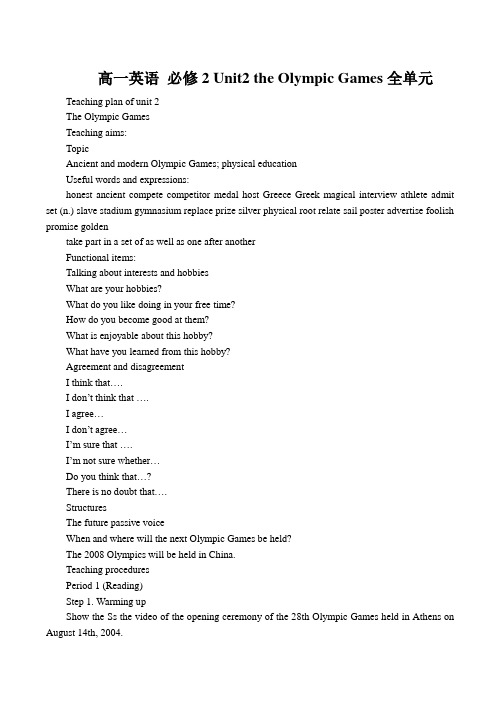
高一英语必修2 Unit2 the Olympic Games全单元Teaching plan of unit 2The Olympic GamesTeaching aims:TopicAncient and modern Olympic Games; physical educationUseful words and expressions:honest ancient compete competitor medal host Greece Greek magical interview athlete admit set (n.) slave stadium gymnasium replace prize silver physical root relate sail poster advertise foolish promise goldentake part in a set of as well as one after anotherFunctional items:Talking about interests and hobbiesWhat are your hobbies?What do you like doing in your free time?How do you become good at them?What is enjoyable about this hobby?What have you learned from this hobby?Agreement and disagreementI think that….I don’t think that ….I agree…I don’t agree…I’m sure that ….I’m not sure whether…Do you think that…?There is no doubt that….StructuresThe future passive voiceWhen and where will the next Olympic Games be held?The 2008 Olympics will be held in China.Teaching proceduresPeriod 1 (Reading)Step 1. Warming upShow the Ss the video of the opening ceremony of the 28th Olympic Games held in Athens on August 14th, 2004.Ss say something about the Olympic Games.Ss finish the chart on page 9.Step 2. Pre-readingLet the Ss discuss the three questions in pre-reading.Collect answers from the Ss.Step 3. While-readingFirst listen to the tape, paying attention to pronunciation and intonation, and try to get the general idea of the passage.(It tells us the differences and the similarities about the ancient and modern Olympics.)2. Ss read the passage and answer the following questions:1). What upsets Pausanias about the modern Winter Olympic Games?2). What amazes Pausanias about the modern summer Olympic Games?3). Why does Pausanias think Athens, Greece and Beijing, China should feel proud?4). Why does Pausanias think people may be competing for money in the modern Olympic Games?5). What makes Pausanias happy about the modern Olympic Games?3. Ss read the whole passage and fill in the table on page 11.Step 4. After-readingSs discuss what they have learned.Suggested answer:Through the comparison between the ancient and modern Olympic Games, we have learned the differences and the similarities between them. Know we can have a deep understanding of the games. From the passage, we can also know that the Olympic Games are developing and improving. It’s our duty to make the Olympic games better and healthier. We know that the principal in 2008 Beijing Olympic Games is Green Olympic Games. It shows that people are paying more and more attention to our environment. In the coming Olympic Games, what will you do?2. Ss discuss: what will you do for the coming 2008 Beijing Olympic Games?HomeworkRecite the key sentences in the text.Retell the text.Period 2. (Language learning and grammar)Step 1. RevisionSs try to retell the text, using their own words.Step 2. Language pointshost (v.)are to be heldadmit (v.) admitted admittedbe admitted to be admitted asas well asmarry sb. be/get married to sb.make sure thatStep 3 Discovering useful words and expressionsSs read the text and finish exercise 1 and 2 on page 11 and 12.Ss read the passage on page 12, part 3 and try to complete it with appropriate words.Ss do exercises 4 and 5 on page 12.Step 4. Grammar: The future passive voiceShow the Ss the following sentences, then change them into passive voice.1). I do my homework.2). I have finished my homework.3). I am doing my homework.4). I will do my homework.The basic form of the passive voice: be + P.P.Ss read the sample on page 13 first and make one poster by themselves using the passive voice.Ss finish the rules for the Olympic Games on page 13.Step 5. PracticeSs do Wb using structures: exercise 2 on page 50.HomeworkReview what they have learnt about the future passive voice.Finish Wb exercises 1 and 2 on page 49.Finish using structures, exercise 1 on page 49.Period 3. Extensive ReadingStep 1. RevisionCheck Ss’ hom ework.Step 2. Reading (P14)Ss listen to the tape to get the general idea.The main idea:The story is about a princess who races to marry the man that can run faster than her. In order to win the race, a man asks for help from the Goddess of Love.Ss read and finish True of False questions.Check the answers.Step 3. Reading (page 51)This reading material includes three different topic about the ancient Olympic Games. Now read the first part and tell the main idea of it.The main idea:It describes the opening ceremony of the ancient Olympic Games.Ss read the second part and the third part and get the main ideasMain idea for the second part:It tells us the training life of a successful athlete and the records that he got for winning the match.Main idea for the third part:A woman was discovered in the Olympic Games. She aroused some argument. A law was passed that women were not allowed to take part in the Games.3. Ss read again and fill the form on page 52.HomeworkFind the sentences which use the future passive voice from the passage.Period 4. ListeningStep 1. revisionCheck the homeworkI will only be marries to a man who can run faster than me.If he can’t run as fast as me, he will be killed.No one will be pardoned.Why will they let themselves be killed?Throw an apple in front of Atlanta when she is running past and she will be relaxed.Step 2. Listening (page 15)Ss are asked to read fast the sentences in part 2 to get the general idea to choose the best answer.Listen to the tape again to number the events.Listen to the tape again and pause at key sentences. Then check the answer.Step 3. Listening task (page 51)Ss read the sentences in part 1 quickly.Play the tape three times and check the answer.Step 4. Listening (page 48)Teacher can say something about marathon.Ss listen to the tape and answer the questions on page 48.HomeworkFinish part 2 on page51.Read the listening material after class.Period 5. SpeakingStep 1. RevisionCheck the homeworkStep 2. Speaking (page 15)Get the Ss carry out a survey of the interests in the class and write down the names of the Sswho have the same interests.The Ss who have the same interests sit together and work in groups of four to talk about their interest.Ask some groups to act their dialogue out.Step 3. Talking (page 48)Now turn to page 48. Look at the requirements first to know what you should do. Do you agree with this idea? Give your opinions using the following expressions.I think that…I don’t think that…I agree…I don’t agree…I’m sure that….I’m not sure whether…..There is no doubt that ….Do you think that…?Step 4. speaking (page 52)Divide the class into groups of three. Ss discuss their training plan.Ss write their training plans in the form on page 53.Period 6. WritingStep 1. Pre-writingSs read the requirements on page 16.Step 2. Writing (page 16)Ss write down what they have to do to study a hobby and tell the others the good things and the bad things.Suggested writing:Swimming is my favorite sport. I like it because it can bring me much fun. The process of learning swimming is very interesting. You can try different ways of swimming, such as breaststroke and backstroke. You can swim at any time of the year if you like. In hokt summer, if you jump into the river or the sea to have a swim, you’ll feel cool and comfortable. Even in cold winter, you can swim if you are brave enough. If you are a beginner, you must be careful. You’d better not swim alone and bring life buoy with you in case of danger. If you want to be a good swimmer, you must have a lot of practice and have great determination.Step 3. Writing task (page 53)1. Suppose you are a coach, and you are coaching a student to prepare for a coming competition. He has practiced for some days. You need to write a report to tell him what he needs to practice to improve further. Now talk about the form and discuss them with your team members.2. Now write a report with suitable expressions according to what you have discussed just now.3. Choose one to read his/her report in class,HomeworkFinish the project on page 53.Period sevenTeachers can use this period freely.Suggestion: Teachers can use this period to let Ss sum up what they have learned and explain what Ss couldn’t understand very well in this unit. Teachers can also add more practice in this period to consolidate what the Ss have learned. Finally, ask the Ss to finish checking yourself. It is very important to improve their learning.。
人教版高中英语 必修二 Unit2 《The Olympic Games ---Reading》
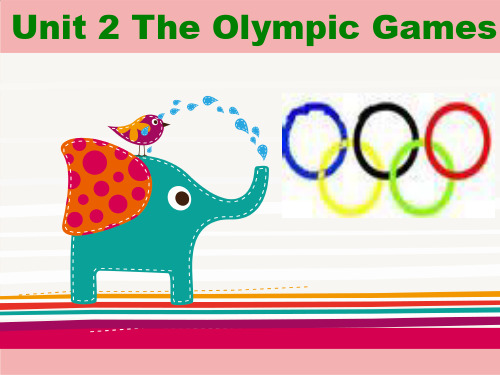
4
When and where did the modern Olympic Games start?
Athens in 1896
Scanning
find the differences and similarities
Types
Events Items Athletes Places
Prize
The modern Olympic games
From 4a._l_l__o_v_e_r_ _t_h__e _w__o_r_ld including 5. _w__o_m___e_n
6. _E_v__e_r_y _c_o_u__n_t_r_y__ i_s_ _p_o__s_s_ib__le__
7.__O__l_i_v_e_ wreath 8. _M__e_d_a_l_s
watch the games.
It’s a greahto_n__o_r__ Games.
to
hostrtehpelaOcelydmpic
The But
iOth’liivgsehsewtrirlleaabthouhtabsebineegfnuar_bt_hl_ee__rt_o__rbuynswm_i_f_et_de_ra__l,s.
the ancient Olympic Games the modern Olympic Games good & bad effects of the OG the similarities between them the differences between them
1
Where did the ancient Olympic Games start?
The five rings stand for friendship of five continents.
- 1、下载文档前请自行甄别文档内容的完整性,平台不提供额外的编辑、内容补充、找答案等附加服务。
- 2、"仅部分预览"的文档,不可在线预览部分如存在完整性等问题,可反馈申请退款(可完整预览的文档不适用该条件!)。
- 3、如文档侵犯您的权益,请联系客服反馈,我们会尽快为您处理(人工客服工作时间:9:00-18:30)。
Unit 2 The Olympic Games1.ancient adj.(1)古代的 in ancient times(2)古老的;年代久远的e.g. We were deeply attracted by the ancient building.ancient—modern—contemporary2.take part in3.event4.stand for代表;主张,支持;容忍,接受stand by袖手旁观,站在……一边 stand up起立,站得住脚stand out显眼,引人注目 stand down退出(比赛等)stand up for为……而站起来,支持 stand up to勇敢地面对,经得起5.interview(1)vt. (记者等)采访,访问(2)vt. 与……进行面谈,面试(3)n. (记者等的)采访;访谈;面试,面谈;(两人之间的)会谈;面谈view看----interview互相之间看(会见;采访)preview先看(预习;预演)review再看(复习;复审)6.journeyon a journey意为“进行旅行”,常与go, start, come, be等搭配使用7.find out about弄清有关……的情况8.time时代,时期against time争分夺秒地,尽快地ahead of time超前的(at) any time在任何时候at no time在任何时候都不at that time在那时at the time of在……的时候before the times在时代前沿behind time在原定时间以后,迟到by this time到此刻,到现在for a time暂时,一度all the time一直,始终at all times无论任何,一直at a time,一次;一度at one time同时;曾经at the same time同时;但,然而at times有时,不时behind the times落后于时代every time每次,每当for the time being暂时,眼下9.regularadj.规则的;有规律的;间隙均匀的;定时的;通常的;平常的;惯常的n.常客,老主顾;主力(或正式)队员10.basis(1)原因,缘由on the basis of…/that…(2)基准;准则;方式on a regular basis例行的,有规律的(3)基础;要素;基点e.g. The basis of a good marriage is trust.辨析:basis抽象 base具体11.admit(1)允许(人或物)进入;让……进入admit sb. to/into…允许某人进入;吸收某人为……的成员be admitted as…作为……被接受(后接表示成员的名词)(2)容纳e.g. This classroom admits only 20 students.(3)承认,供认admit (+to) + sth./doing sth.承认某事;做过某事admit + that-clause承认……admit sb./sth. to be + adj./n.承认……为……e.g. I admit my mistake(that I was wrong).He admitted to stealing my pen.12.nowadays现今;现在;目前13.allow允许,准许;承认allow + n./pron.允许……allow + n./pron. + to do允许……做……allow doing允许做……allow + n. + prep./adv.允许……allow + that-clause承认……He believes that children should/ought to/must be allowed to learn/study(应允许……学习)at their own pace.(allow)14.play a role in (在……中)扮演角色;(在……中)起作用 e.g. Tom Hanks played a leading role (扮演主角) in the film “Forest Gump ”.(play) play a role/part of …表示“扮演……角色”15.as well辨析: 边部分。
此外,还有together with, along with, besides(but, except), including, rather than 等也属此种情况。
e.g. He as well as I likes money.b. not only …but also …连接两个主语时,根据后一个主语确定动词的形式,其侧重点在后一部分。
c. as well as 后接动词时,该动词常用-ing 形式。
d. as well as 位于句首时,后面的动词须用-ing 形式。
3.不能用“A, B as well C ”结构,但可用“A as well as B and C ”或“A and B as well as C ”结构。
16.hostvt. 做东,主办London will host the 30thOlympic Games in 2012.(将主办第三十届奥运会) n.主人,东道主e.g. London will be the host country of the 30thOlympic Games.17. responsibilityresponsibility for sth./for doing sth./to do sth. 对……负责take o the responsibility承担责任 on one’s own responsibility由某人自己负责a sense of responsibility责任感18. honour(1)[C]光荣的人或事(通常用an honour)e.g. He is an honour to our school.(2)[U]荣誉;信誉;名誉e.g. win honour for one’s motherlandMay I have the honour of this dance?(3)[U]尊敬;敬意show honour to…对……表示敬意(4)vt. 尊敬,给某人以荣誉honour sb. with sth.用某事来向某人表达敬意be/feel honoured to do sth.(做某事)感到荣幸e.g. Will you honour me with a visit?其他可具体化的抽象名词,表示“一个……的人、一件……的事”,surprise, pleasure, delight, success, failure.19.must(1)(表示必要或很重要)必须(2)(表示很有可能或符合逻辑)一定e.g. You must think math is difficult.(3)(提出建议)应该,得e.g. You must study hard.may/must/can + v.表示对现在事实的推测。
对过去事实的推测用情态动词+ have + done 这种结构。
--Hi, Tom. Any idea where Jane is?--She ____ in the classroom. I saw her there just now.A. shall beB. should have beenC. must beD. might have been20. replace(1)代替,取代replace sth./sb.replace sth./sb. with/by(2)替换(3)把……放回原处take the place of sb./sth. = replace sb./sth.take one’s place = take one’s seatin place of instead of21. competecompete with/against sb. for sth.因……而与某人竞争compete in sth.参加比萨(或竞争)in competition with 与……竞争22.high辨析:用法类似的副词还有:wide, widely; deep, deeply; close, closely23.swift(1)迅速发生;马上做出的,迅速的(2)速度快的;敏捷的;矫健的辨析:24. similaritysimilarity between A and Bsimilarity to sb./sth.similarity in sth.be similar to sb. be similar in sth.25. put forward(1)推荐,举荐e.g. He put me forward for monitor.(2)提出,提议;建议(3)将……提前(4)向前拨快(时钟指针)put away put down put in put off put on put up put up with26.bargaininto the bargain=as well另外,而且,也bargain with sb. over/about/for sth.就某物与某人讨价还价bargain sth. away做亏本交易,贱卖bargain for/on sth.(常用于否定句中)预想到,预料到make a bargain with sb. about sth.与某人就……达成协议strike a bargain with sb.与……成交27.run against(1)和……赛跑(2)竞选(3)撞到,碰着e.g. Lost in thought, he ran against a lamp-post.run across无意间碰到run at攻击,向……冲去run for竞选run out (of)(某物)用完run over溢出,轧过run short (of)缺(某物),快用完(某物)了run after追赶;追求run away走掉,跑掉run into无意间碰上;撞上28.hear of辨析:29.amazedbe amazed at sth./to do sth./that…30.pick up(1)捡起;拾起;抬起(2)(用车)去接某人(3)收拾,收取(4)获得,(偶然)学会e.g. You can pick up Chinese easily if you live in China.(5)(车辆)中途搭人或接货(6)收听到;接收e.g. We picked up signals for the exam.(7)买到某物(尤指廉价地或幸运地)e.g. She picked up some fine dresses on sale.(8)使增加;加快e.g. The car is picking up speed.(9)恢复(健康、体力)等pick and choose挑拣,精挑细选pick one’s brains讨价,请教pick holes in sth.挑毛病pick up pieces(使)恢复,补救,收拾残局pick sth. off去除,剪除pick on sb.(跟某人)找别扭,故意刁难别人;选中pick sth. out精挑细选;辨别出31.painon/under pain of sth.违犯规则受到某种惩罚a pain in the neck及其讨厌的人(或物)at (the) pains尽力,用心,下苦力bear/endure/under pain忍受痛苦spare no pains不遗余力,全力以赴take pains尽力,费苦心,耐心32. one after anotherone after another一个接一个地(强调连续性) one by one一个一个地(强调一次一个)。
